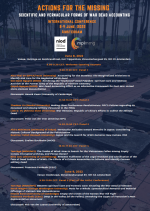
Actions for the Missing: Scientific and Vernacular Forms of War Dead Accounting
This workshop seeks to foster a comparative discussion of scientific and vernacular attempts to account for the missing in action in a number of post-World War II contexts. Finding, identifying, and placing the remains of war dead in the right social and political order are processes deemed crucial for healing and repair in the aftermath of violent conflict; increasingly, DNA-based forensic technology has come to define these accounting efforts, setting standards and expectations beyond the realm of the laboratory.
While the heightened focus on exacting genetic evidence marks a shift in scientific methods for producing empirical truths about the unidentified, those truths nevertheless exist within a variety of locales, sometimes encountering resistance from those for whom the identification of their relatives is not merely—if at all—a scientific matter. The result is an intricate process in which the various actors (e.g., state officials, policy makers, scientists, families of the deceased, and veterans) pursue different objectives with different methods, and ultimately different truth claims. At the center of all this action are the missing war dead themselves, whose physical remains continually remind the living of a past that refuses to be buried and a future ripe for national(ist) and geopolitical resignification.
The questions raised in this panel therefore deal as much with the identity of the dead as with the relations of the living. Among them, fundamentally is the tension surrounding which dead matter and when. For instance, in Vietnam, the state goes to great lengths to identify the fallen soldiers of the Communist Army, but hinders attempts to locate and name the war dead of the South Vietnamese army. Moreover, recovered and named missing are hardly ethereal matter; they re-enter societies and cultures that have their own understanding of death and the dead. What renders them legible? What role does forensic technology play in animating their reclaimed presence?
The missing dead of the Spanish Civil War and the missing dead of the Vietnam War/American War can both be identified by similar forensic methods. But the divergent interpretations of their deaths and their remains in the contemporary societies of Spain, Vietnam, and the United States can only be understood by comparative methods. Along similar lines, recent efforts to exhume and identify unknowns from the Korean War expose both common aims and diverse ends. By convening scholars working on these different temporal and geographic contexts, the panel seeks to facilitate comparison of forensic responses for which the remains are material objects of inquiry and vessels of sociopolitical and cultural signification.
Questions to be raised: How do efforts to account for the missing in action reflect historical as well as contemporary state interests? What modes of knowledge production animate remains recovery and identification and how does forensic scientific evidence shape contemporary discourse of war dead commemoration? How do places of loss shape terms and practice of remembrance?
For more information and registration (before May 18, 2022), please contact Dat Nguyen via d.nguyen@niod.knaw.nl.
Programme
For the conference programme, see the poster below (click here to enlarge):
